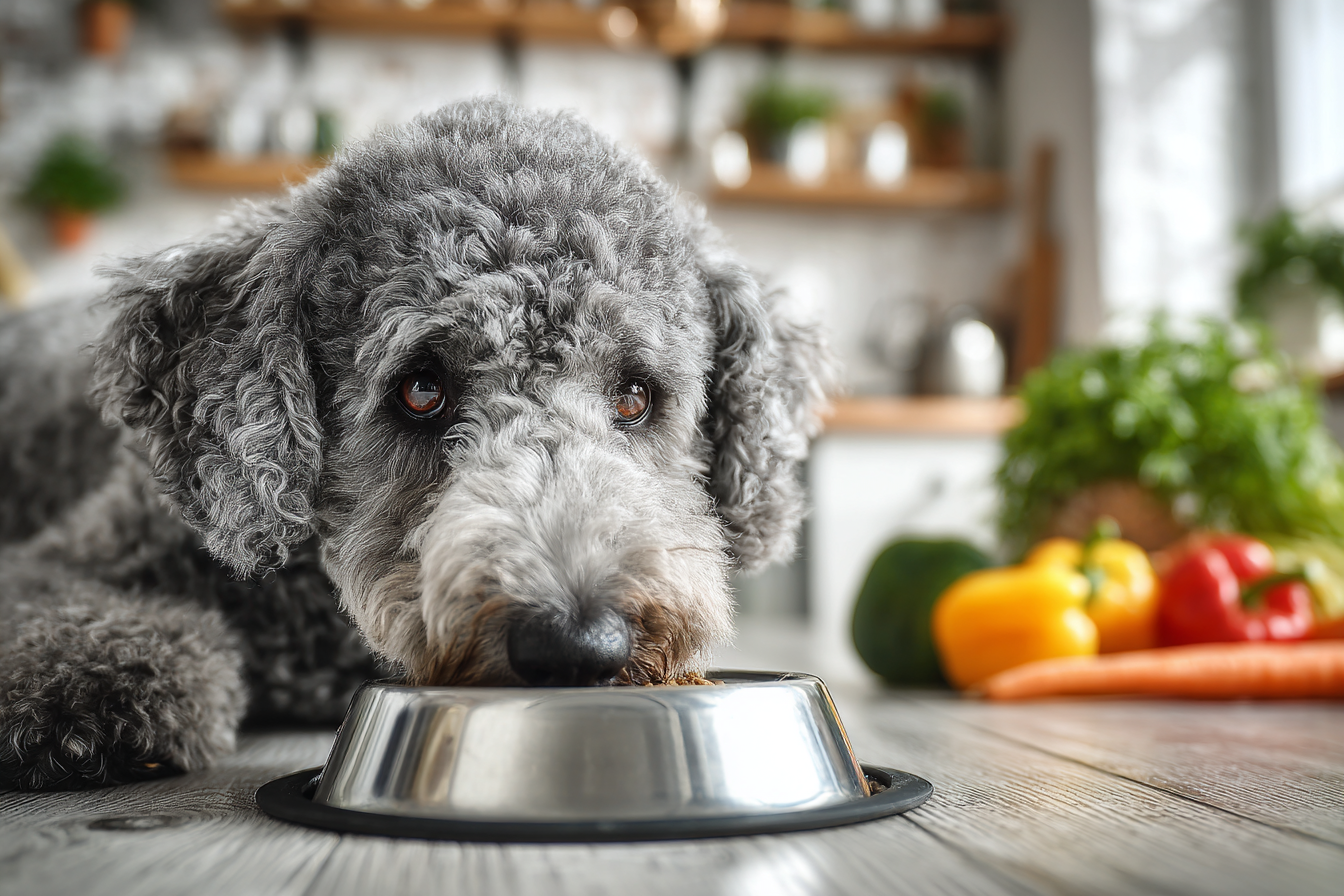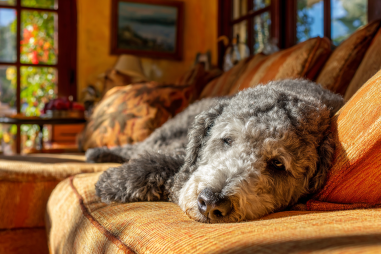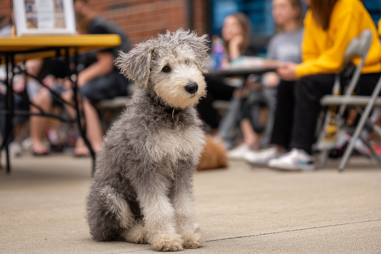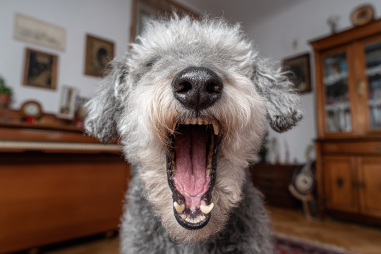Feeding your Bedlington Terrier the right diet goes beyond simply providing food; it’s about offering balanced nutrition that supports their unique health needs and lively personality. This distinctive breed, known for its lamb-like appearance and energetic demeanor, thrives on a carefully considered diet tailored to maintain muscle tone, support their coat, and promote overall vitality. Understanding the optimal nutritional requirements, choosing the right ingredients, managing portions, and being mindful of supplements and avoidable foods can help your Bedlington Terrier live a happy, healthy life.
Nutritional Needs of Bedlington Terriers
Bedlington Terriers are medium-sized dogs with a muscular yet lean frame. Their energy levels are moderate to high, often requiring a diet that balances protein, fats, and carbohydrates. Protein is especially important for maintaining muscle mass and supporting their active lifestyle. Look for a diet that provides at least 18-22% protein sourced from quality animal ingredients like chicken, lamb, or fish.
Fats play a crucial role in supporting coat health and providing concentrated energy. Omega-3 and Omega-6 fatty acids help keep their distinctive coat shiny and skin healthy, while also supporting brain and joint function. Carbohydrates from wholesome grains or vegetables serve as a good energy source but should be offered in moderation to avoid unnecessary weight gain.
Vitamins and minerals are also essential, particularly antioxidants like vitamin E and C to support immune health, as well as calcium and phosphorus to maintain strong bones and teeth. Additionally, Bedlington Terriers are somewhat prone to copper metabolism issues, so their diet should be balanced without excessive copper levels.
Recommended Dog Food Types and Ingredients
When choosing dog food for your Bedlington Terrier, whether commercial or homemade, focus on quality ingredients and protein sources. Here are some recommended types and ingredients:
- High-Quality Dry Kibble: Look for brands that specify the meat content upfront, have whole food ingredients, and minimal fillers like corn or soy. Ingredients such as lamb, chicken, or fish listed as the primary protein source are best.
- Wet or Canned Foods: These tend to be more palatable and hydrating. Choose options with natural ingredients and avoid those with artificial additives or excessive salts.
- Raw or Homemade Diets: If opting for a raw or home-cooked approach, ensure a balanced mix of lean meats, vegetables, and grains, supplemented by vitamins and minerals as advised by a veterinarian or canine nutritionist.
- Limited Ingredient Diets: Ideal for those Bedlingtons with allergies or sensitivities. These diets limit the number of ingredients to reduce potential allergens.
Always review ingredient labels carefully and choose foods free from harmful additives, preservatives, or excessive fillers that do not provide nutritional value.
Portion Control and Feeding Schedules
Bedlington Terriers can be prone to weight gain if overfed, so controlling portion sizes is crucial to maintaining a healthy physique. The amount of food depends on their age, weight, activity level, and metabolism. As a general guideline:
- Puppies require more frequent smaller meals — typically 3-4 times a day — to support growth.
- Adult Bedlington Terriers thrive on two balanced meals per day to maintain energy and prevent overeating.
- Seniors may need fewer calories due to decreased activity but still benefit from regular meal times to aid digestion.
Using a measured cup or kitchen scale helps keep portions consistent. Avoid free feeding (leaving food out all day), as it encourages overeating. Adjust portions based on regular weight checks, energy levels, and body condition scoring.
Supplements and Treats
While a balanced diet typically offers all the nutrients your Bedlington Terrier needs, some supplements and treats can enhance their health when used wisely:
- Omega Fatty Acids: Fish oil supplements can promote a healthy coat, skin, and joint health.
- Glucosamine and Chondroitin: These supplements support joint health, especially as your dog ages or if prone to mobility issues.
- Probiotics: Beneficial for digestive health and can improve nutrient absorption.
- Training Treats: Use low-calorie, natural treats to avoid unwanted weight gain. Many dog-friendly fruits and vegetables like carrot sticks, apple slices (without seeds), or green beans make good options.
Always check with your veterinarian before starting any supplement regimen to ensure safety and proper dosing.
Foods to Avoid
Certain foods can be harmful or toxic to Bedlington Terriers and must be avoided to keep them safe and healthy:
- Chocolate and other caffeinated products
- Grapes and raisins, which can cause kidney failure
- Onions and garlic, potentially harmful to red blood cells
- Excessive fatty foods, leading to pancreatitis or obesity
- Xylitol, a sweetener found in sugar-free gums and candies, highly toxic
- Cooked bones, which can splinter and cause internal damage
Additionally, avoid feeding your Bedlington Terrier table scraps regularly, as they often contain too much salt, fat, and seasonings that are not suitable for dogs.
Monitoring Weight and Health Through Diet
Keeping an eye on your Bedlington Terrier’s weight and overall health is a critical part of a successful diet plan. Regularly assessing their body condition will help you adjust food portions or switch foods as needed. Here’s how to monitor effectively:
- Feel for ribs: You should be able to feel their ribs easily without excess fat covering but not see them protruding.
- Check waistline: Viewed from above, they should have a visible waist behind the ribs.
- Monitor energy levels: Healthy Beddies are active and playful. Sudden lethargy or hyperactivity may suggest dietary imbalances.
- Regular vet checkups: Your vet can help monitor your dog’s health indicators such as weight, blood work, and organ function, which can highlight any nutrition-related issues early.
If you notice signs of weight gain, digestive upset, or skin problems, reconsider your dog’s diet and consult your veterinarian for tailored advice.
Feeding your Bedlington Terrier an optimal diet tailored to their unique nutritional needs will keep them lively, healthy, and comfortable throughout their life. From choosing quality ingredients and managing portions to avoiding harmful foods and supplementing wisely, every step plays a role in supporting this charming breed’s wellbeing. With attentive care and informed choices, you ensure that your Bedlington Terrier enjoys many happy years by your side.







